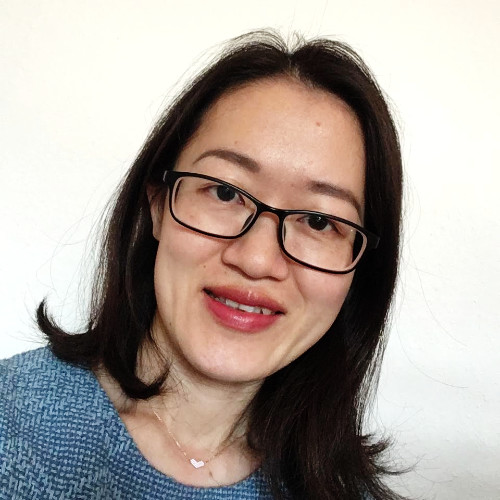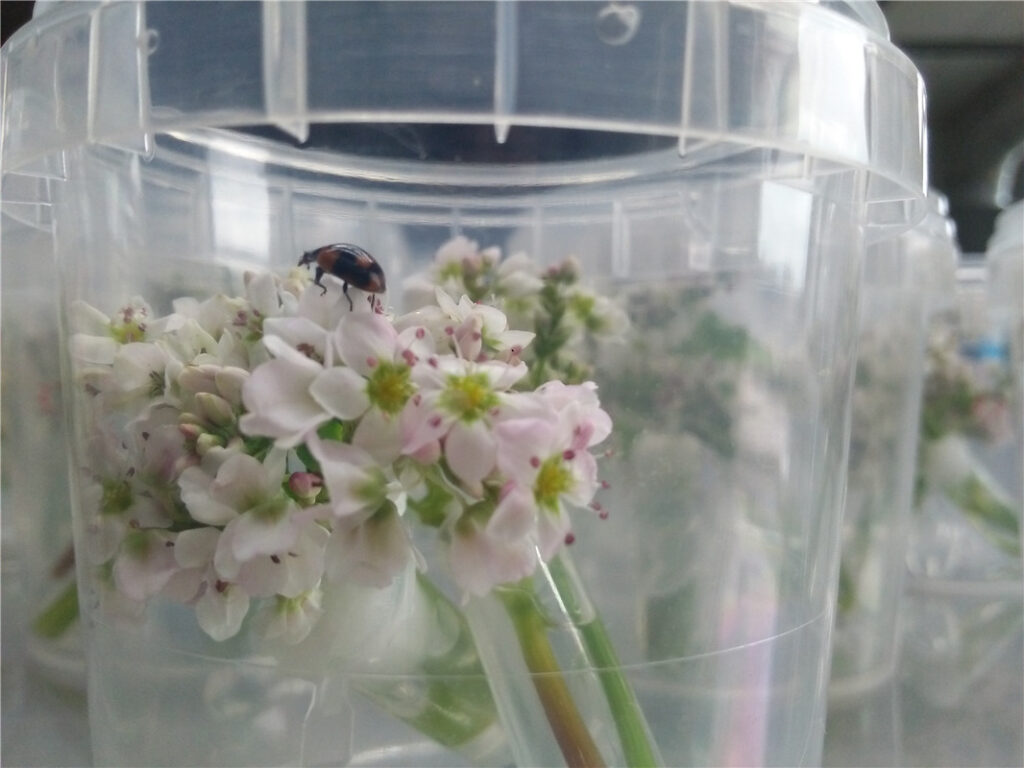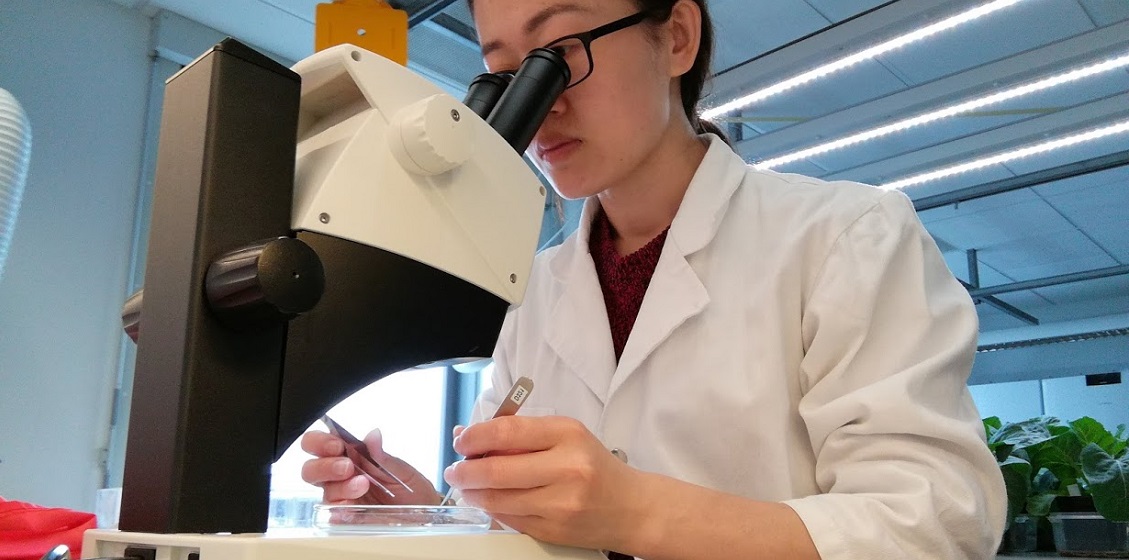Xueqing He is a Chinese student, with a master’s degree from China Agriculture University in Beijing, currently on her last year of her PhD at the Department of Plant and Environmental Sciences at the University of Copenhagen. I met with Xueqing, to learn more about her experiences and findings, on how to utilize insects to regulate plant pests, as a sustainable alternative to the predominant use of pesticides.
“So, Xueqing, would you like to tell us a little bit about your research area?”
“There are many different ways to ‘destroy’ pests; I’m specialising in biological control. Simply put, this means, using another organism to control the pest. For example, ladybugs can eat many aphids (a kind of pest), so we can use ladybugs to control aphids. I’m trying to find ways, to efficiently use insects to control pests. This is beneficial for both us and the environment,” Xueqing says.
“What does it mean to do a PhD in this field? What are you experimenting with during your everyday work?”
“Well, because these insects are alive, I have to figure out how to confine them to control pests. I’m experimenting with ladybugs, which tend to fly away if there is not enough food around. So, I need to find a way, to make them stay on the field and be ready for pest,” she says.
She adds: “However, ladybugs also consume plant pollen and nectar (non-prey diet), too, so I’m experimenting with different flowers, to find out which one the ladybugs prefer. The idea is to plant some flowers on the side of those crops, for the ladybug to find some food there instead of flying away.”
“Could you tell us a little bit about the difficulties you encounter during your research?”
“Well, when deciding, as a scientist, which plants these ladybugs prefer, you have to take into consideration that you might not get the same results at the lab, as you would on a field test. For example, at the lab, you plant the exact number of flowers you need, but at the field, you might end up with less flowers, because of the weather. So, something that works nicely at the lab, might not work at the field,” Xueqing says.
Buckwheat and dill flowers have given her successful results so far.
“How is your everyday work at the lab? What are you exactly working with?”
“During the experiment, I had to replace the old flowers with new flowers every day, to see how long the ladybugs can survive on flower diet. So, basically, I was babysitting these ladybugs,” Xueqing says, while laughing.
She adds: “I have been experimenting with sugar solutions also: Ladybugs can live up to two to three months on sugar solutions only, with no ‘meat’ at all!”
“Do you expect your research findings to have an impact back at your home country?” I ask Xueqing.
“Yes, although I don’t have a very detailed plan yet! China is an agricultural country and has thousands of years of history in agriculture. There are many people nowadays that are working on trying to combine the knowledge from the past with these new findings. More and more young people are becoming farmers, too, and the government is really supporting this! [The] Chinese realize that the modern agricultural system is not really working – I mean, we use pesticides and we realize the problems in this area that we need more healthy and sustainable food, so, as more know about this, and more push, this field is growing fast! I’m very happy to see that there are more and more people working on this now, so, I see that I’m not alone!” she says.
“How did you find out about the University of Copenhagen?” I ask.
“I did my master’s in China and my previous supervisor [collaborated] with my current supervisor. I am a big fan of organic agriculture, and organic farming is well-developed in Denmark!” she says.
“What is it like doing your research at a Danish University?”
“Here people treat you as a member of the staff, you are not a student anymore! You are very independent in your work,” she says, adding: “And, honestly, I think here people are super nice! They are really nice!”
“Why did you choose to do research on sustainable food production?” I ask.
“After the Second World War we kept producing as much as possible, to not let people [go] hungry. Today, we still use a lot of pesticides. Of course, we are aware of the harm that those pesticides cause, [but, previously,] we only focused on the benefits of using them. Today’s pesticides are not as poisonous as in the past, though. The reason I’m doing this research is because I believe that we can do better and I’m trying to do my part on this! I want to deliver this message: That we can use organisms from the nature to control the pests instead of pesticides,” she says.
“Also, my parents are farmers and I grew up on a farm. I know that some people think, that organic agriculture sounds sometimes like a fairy-tale. It, [sometimes,] sounds super idealistic! I have friends that have tried organic agriculture and they have failed really [badly]! The reason behind [this,] is that it comes with a lot of work; you need to plant those plants and then, you need to take care of them, which requires a lot of time! [In] the end, they don’t get that much out of it,” she adds.
“Even here in Denmark… I thought that being a farmer is nice. Then, I visited a farm and I realize that, no, this is not the case! Being a farmer is difficult everywhere! I don’t like this, because they are the foundation of the society and they shouldn’t be treated like this! That is not fair!” she adds.
Xueqing has volunteered at two organic farms here in Denmark.
“I like organic agriculture and I’m doing research on it, but I wanted to see, how it really is out there, what’s going on in a real organic farm in Denmark. Of course, it’s fun, too!” she says, while laughing.
She believes we can do better by learning from the nature and wants to continue her research in this area of sustainable agriculture research and development and assist in developing new methods.

Xueqing He, PhD student at Dept. of Plant and Environmental Sciences, Section for Organismal Biology, University of Copenhagen
Agriculture in China
China has a long and proud farming history, and, organically developed traditions of intensive cultivation, particularly because of the enormous rural populations of the country. According to the Food and Agriculture Organization of the United Nations (FAO), China, despite only approximately 10 percent of the world arable land, produces approximately one fourth of the world’s entire production of grains. Likewise, China feeds nearly one fifth of the world’s entire population.
Source: http://www.fao.org/china/fao-in-china/china-at-a-glance/en/

Ladybugs
The scientific name of the common little ladybug is a Coccinellidae. This little bug has an average life span, when living in the wild, to 2 to 3 years. The ladybug is a common protector of crops, and a farmer’s dear friend, due to the insatiable consumption of plant-eating pests. The ladybug is so insatiable that the second a larvae is hatched it begins feeding. A single ladybug can in its short lifetime eat thousands of aphids, and with its spots and coloring, it appears unappealing to its natural predators, which makes it a small, but efficient tool in controlling plant-eating pests. However, the appetite varies among the different kinds of ladybugs, which makes it increasingly difficult to gather knowledge about their preferred eating habits.
Source: https://www.nationalgeographic.com/animals/invertebrates/group/ladybugs/
Aphids
An Aphids, is a soft-bodied insect, which feeds on plant saps through a sucking mouthpart they pierce through the plant. Aphids are considered among the most destructive insect pests, especially, due to their extreme reproduction (the female aphids give birth to more females, without the involvement of the male). Likewise, have control of the aphids, previously, proved difficult, as the insects often feed on the underside of the leaves, which sometimes makes the usage of pesticides redundant and inefficient.
Source: https://www.marefa.org/images/e/ea/Piper_Extraordinary_Animals-An_Encyclopedia_.pdf



